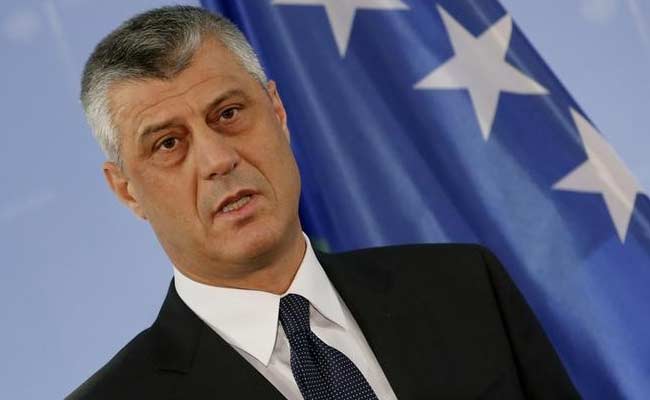
Kosovo's
Foreign Minister Hashim Thaci speaks to the media prior to a meeting
with German counterpart Frank-Walter Steinmeier in Berlin March 2, 2015.
(Reuters)
Thaci, the first Prime Minister of independent Kosovo until last year, told Reuters he hoped for tangible results in the coming months, such as a new EU visa regime for Kosovo.
"It is the moment when Brussels should move from rhetoric and nice words about Kosovo to concrete measures," Thaci said in Berlin today, after meeting his German counterpart Frank-Walter Steinmeier.
Kosovo, a poor, landlocked state of 1.7 million people, declared independence from Serbia in 2008, but Belgrade and its former Soviet master Moscow refuse to recognise this and have blocked its membership of bodies such as the United Nations.
Thaci, who led armed ethnic Albanian units in the 1998-99 guerrilla war against Belgrade troops as Yugoslavia collapsed, said Pristina saw this continued isolation as an "injustice".
But EU membership is an aspiration shared with other Balkan states, including Serbia, and Thaci said this "will eventually force Serbia to accept the reality" of Kosovo's independence.
While Montenegro, Serbia, the former Yugoslav Republic of Macedonia, Albania, Bosnia and Herzegovina and Kosovo are all looking to join the EU, Brussels has said organised crime, corruption and media restrictions are limiting progress.
Thaci called for the membership process to be speeded up.
"The EU should not delay the accession and enlargement processes and integration of Kosovo and the region into the European Union, but also in NATO," he said.
Russia has drawn parallels between its annexation of Ukraine's Crimea last year, and NATO's military support for Kosovo's self-determination in 1999. Thaci rejected this and said Pristina's future lay in the "Euro-Atlantic family".
"Any delay in this process is a dangerous one. It opens the way for penetration and the increase of influence of Russia in political terms, economic term and military terms," he said.
"But it also opens the way for ISIS to penetrate the region and influence the region," he said, referring to Islamic State.
Kosovo's ethnic Albanian majority is mainly Muslim but with a largely secular lifestyle.
Local police have arrested dozens of people suspected of fighting with groups like Islamic State in Syria and Iraq. Thaci said Pristina had also arrested imams suspected of inciting extremism and taken other action to show it was an enthusiastic member of "the global coalition against ISIS".
He blamed a surge in the number of Kosovars trying to leave for EU states on human traffickers, saying they spread rumours that people could get asylum in order to exploit them.
Working with Germany, where there was a media panic this year about an "avalanche" of Kosovar asylum-seekers, Thaci said the government was stemming the tide by informing people that 99 percent of asylum requests from Kosovo were rejected because they had no grounds to allege persecution.
"What I can say with full confidence is that the number of people who want to leave Kosovo has drastically decreased."
© Thomson Reuters 2015
No comments:
Post a Comment